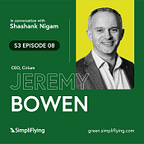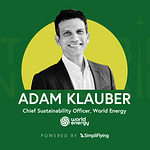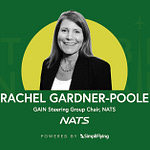Welcome to Season 3 of Sustainability in the Air, the world’s first podcast dedicated to sustainable aviation. Through in-depth conversations with top aviation leaders, we break through the clutter and provide a clear roadmap for a net-zero future.
As the industry leader in aviation analytics, Cirium assists the aviation industry in predicting future trends through its rich datasets that date back to 1947 and cover over 400,000 aircraft! Cirium works together with industry actors and even supports global search engines to help build a more efficient and sustainable future.
In this episode of our ‘Sustainability in the Air’ podcast, Cirium’s CEO Jeremy Bowen speaks with SimpliFlying CEO Shashank Nigam and shares how the company is empowering the industry to reach a more sustainable future with the most accurate aircraft emissions data.
Bowen was appointed as Cirium’s CEO in 2019, and has since expanded the company’s data portfolio and technology offering, and aligned company operations. He has worked extensively in data and analytics throughout his career. Before Cirium, Bowen held leadership positions at Accuity, Fircosoft and Dun & Bradstreet.
You can listen and subscribe to our podcast on all major podcast platforms or read our deep dive into the episode below.
Data and the sustainability challenge (03:05)
Cirium’s aircraft emissions data model (05:57)
The need for accurate data and benchmarks (08:54)
Cirium’s rich data heritage (11:26)
How carbon budgets may curb business travel (14:18)
An impending shift in corporate and leisure traveller behaviour (17:57)
How efficient are eVTOLs really? (23:43)
The 44,000 aircraft question (25:58)
Is net zero by 2050 realistic? (31:11)
Rapid fire! (33:52)
With great data comes great responsibility
Cirium is the industry leader in aviation analytics. Their on-time performance reports, for instance, are considered gold-standard benchmarks. When it comes to sustainability, however, Bowen is more circumspect. While he admits that Cirium is evaluating the possibility of building a sustainability benchmark, he emphasises that the company wants to be absolutely sure of the validity of such a product. “We don’t think the time is quite right yet”, he says.
While a sustainability benchmark product might be a way off, Cirium has a wealth of data that airlines can use today. For example, their highly-accurate Global Aircraft Emissions Monitor is a valuable starting point for any airline that wants to seriously plan emissions reduction – and, eventually, hit net zero. After all, without the data to measure current baselines, any effort to go green will be a shot in the dark.
Bowen says the strength of their emissions calculator lies in rich datasets that go back many years. “When you lay data science over them, we’re able to come up with some fantastically accurate forecasts of what might happen as well as retrospective measurements of what happened”, he says. The calculator focuses on the granularity of data and does not rely on averages.
To elaborate, the fleet information in Cirium’s database has information on not just every single aircraft but also various other parameters including engines, winglets, age, and the exact cabin configuration. “This data is combined with satellite tracking, so we know exactly when that aircraft pushed back, how long it taxied, how long it was in the air, did it hit headwinds on its journey and so on”, explains Bowen. This ensures highly accurate information about the amount of fuel that was burned on a particular flight.
This is not empty talk. Cirium has also verified the accuracy of its model with Virgin Atlantic and American Airlines. Despite his obvious belief and pride in the model, Bowen is aware the model may not be perfect due to various reasons – airlines might swap out equipment; some might use sustainable aviation fuel on certain legs; some might have contrails and so on. But ultimately, he believes their calculator is the most accurate in the industry.
Emission Impossible: The Net Zero Target
Bowen knows, of course, that getting to net zero emissions even by 2050 is going to be hard. “We can play around the edges and look at the areas which are not necessarily the aviation fuel, such as the airport electric vehicles”, he muses. “But at its heart, to decarbonise long haul aviation, in particular, is really difficult.”
He believes that the time for action is now because radical change is inevitable. Bowen believes that if airlines don’t act on their own, governments are going to regulate the industry and make it difficult for airlines to stick to the status quo. Ultimately, passengers will suffer, and that’s not an outcome that the industry wants.
While sustainable aviation fuel is in short supply and electric and hydrogen aircraft are in their technological infancy, where can real change be made? Airlines are eyeing fleet renewal and operational efficiency improvements as the most viable short-term solutions. But Bowen strikes a note of caution. “It’s frightening how many people don’t know where they are [with respect to emissions],” worries Bowen. “Our role is letting people know where they and their peers are.” In order to help airlines on their journey, Cirium is not just making data available but ensuring that it’s easy to use and deploy through APIs and lookup tools and embedding it into their workflows.
What about non-CO2 emissions? Bowen explains that Cirium doesn’t include these in their model for a number of reasons despite having analysed various permutations and combinations of non-CO2 data. “Not every flight has it. And then when it happens, it doesn’t happen for the whole duration of the flight. So it’s really hard to report and predict”, he says.
“We are not relying on airlines providing this data. We’ve got data coming in from 800 airlines across the globe. We are completely independent and are here to make the data as accurate as possible.”
The future: Budgeting for carbon
Cirium focuses on presenting transparent, impartial and accurate data to decision-makers. “Our job is not to recommend to airlines how to layout their cabins. It’s to report on the facts”, asserts Bowen. “If we know that for an airline a business class seat is less fuel efficient, or less carbon efficient, then our job is to report it.”
Bowen says that what’s important is that passengers are increasingly interested in this data. Soon, their travel decisions and choices might be based on the carbon efficiency of their trips. This, ultimately, could persuade airlines to think about how they configure their cabins or plan their fleet renewal programmes.
A sustainable future, according to Bowen, will require carbon budgeting — specifically in the corporate sector. Just as corporations have traditionally managed travel budgets, they are likely to start considering strict carbon budgets as well. “So when they’re booking online, they can go right, well, I can fly that business class seat, or I can trade down because I’m running out my carbon budget”, explains Bowen.
Case Study: The client that shifted to more carbon-efficient flying
This is not wishful thinking: the TravelSmart campaign is already pushing companies to cut business travel emissions by 50% from their 2019 levels. Bowen explains further that carbon budgets might determine not just the class of travel but also the airline and aircraft type passengers opt for, depending on the most carbon-efficient flight on a particular route.
To drive home the point, Bowen says that Cirium is already noticing a marked change in attitudes towards business travel. Carbon consciousness is impacting not just budgets but budget allocations as well.
“We showed a client their corporate travel for over three months and showed them the carbon emissions on the flights that were available at the point of booking”, recalls Bowen. While the client had two preferred airlines that they use across the Atlantic, Cirium’s analysis showed that the client’s team had booked flights for the far less efficient one. Bowen says that the data persuaded the corporate travel manager to stop booking on the less carbon-efficient airline. “And that was a very large corporation with a large travel management”, says Bowen, emphatically driving home the point that the shift to sustainable travel is real, urgent and coming sooner than we think.
Our Take
As the perils of climate change are fast becoming a reality, the transition to net zero has never been this urgent. Aviation remains an industry that is difficult to decarbonise. With few options at its disposal and very little time to implement them, every sustainability transition must be planned with due care and diligence.
Data analytics can be particularly helpful in informing these decisions and enabling a greener future, especially for benchmarking and setting baselines. Large datasets, however, can often suffer from a lack of quality data. A 2017 study involving 75 executives found that data quality is far worse than most companies’ estimates — only ~3% of the data quality scores were deemed acceptable.
Data quality refers to the degree to which data or dataset records are complete, consistent, reliable and context-based. Considering the sheer volume of data, it is extremely difficult to maintain its quality and integrity in a timely way.
This is where Cirium’s data products can make a difference. The company leverages hundreds of data sources that are then put through automated processes to catch and isolate unexpected null data, improperly formatted data and other outlier data. Each anomaly is flagged, reviewed and corrected.
Moreover, as Bowen mentions, Cirium has the largest and most comprehensive fleet database in the world. It details nearly 170 different fuel burn models, based on engine type, aircraft and winglets. In addition, the company also helps airlines and data suppliers spot data integrity issues.
As Bowen rightly says: “As the industry starts to get measured effectively – and then fined or rewarded based on it, the accuracy of the data will be the most important [parameter].”
Our Sustainability in the Air podcast is powered by SimpliFlying which has been helping build trust in travel for over a decade.
This season of the podcast is brought to you by Cirium and CarbonClick. As a sustainability partner, Cirium helps the aviation industry gain a much clearer view of carbon emissions and develop methods to reduce them, enabling on the industry promise to fly sustainably. CarbonClick is the industry leader in managing transparent carbon offsetting programs for individuals and top global airlines.














